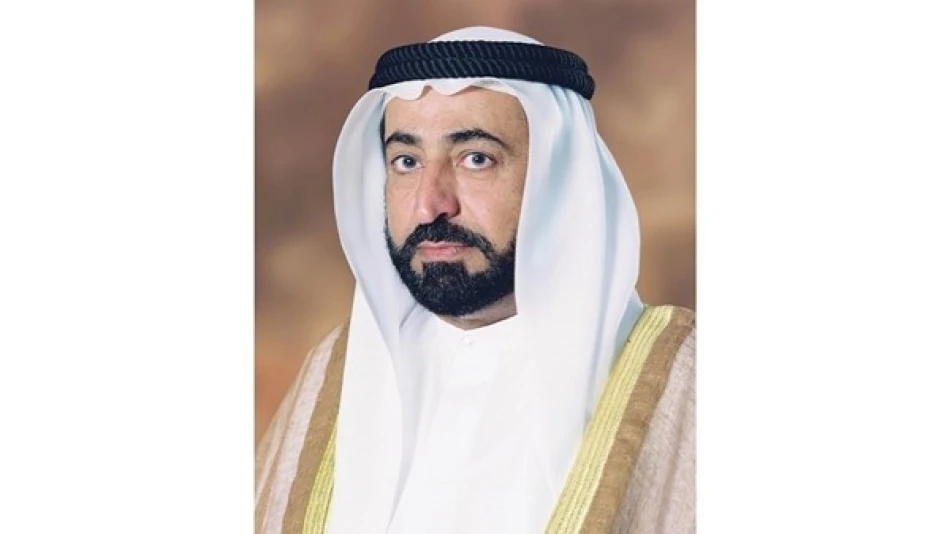
Sharjah Ruler Sponsors Landmark Nigerian Arab Poetry Forum
Sharjah Expands Arabic Poetry Initiative Across Africa with Fourth Nigerian Forum
The United Arab Emirates' cultural diplomacy strategy reached a new milestone as Sharjah launched its fourth Arabic Poetry Forum in Nigeria's capital Abuja, bringing together 17 poets in an ambitious effort to strengthen Arabic language presence across Africa. The initiative, personally sponsored by Sharjah's ruler Sheikh Dr. Sultan bin Muhammad Al Qasimi, represents a calculated soft-power investment that positions the emirate as a leading cultural bridge between the Arab world and Africa's 1.4 billion population.
Strategic Cultural Investment in Africa's Largest Market
Nigeria, with over 220 million people and Africa's largest economy, serves as a crucial testing ground for Arabic cultural expansion. The forum attracted high-level participation, including Nigeria's Minister of Arts, Culture, Tourism and Creative Economy, Hannatu Musawa, alongside prominent academics from Bayero University Kano and Kaduna State University.
This initiative aligns with broader UAE strategies to diversify cultural and economic partnerships beyond traditional Western markets. While Dubai focuses on business and finance, Sharjah has carved out a distinctive niche as the UAE's cultural capital, investing heavily in Arabic language promotion across Africa and Asia.
Beyond Literature: Building Long-term Influence
The poetry forums serve multiple strategic purposes. Dr. Omar Adam Mohammed, the forum's general coordinator, emphasized how the initiative creates lasting institutional relationships between Nigerian universities and Sharjah's cultural apparatus. This mirrors successful Chinese Confucius Institute models, establishing Arabic language and culture as soft-power tools.
Minister Musawa highlighted Arabic poetry's historical role in preserving "collective memory" and spiritual values across African societies. This cultural resonance provides the UAE with authentic entry points into African markets, contrasting with purely commercial approaches used by other Gulf states.
Timing Advantage in Global Cultural Competition
The forum's launch coincides with reduced Western cultural programming across Africa, creating opportunities for alternative cultural powers. While China invests billions in African infrastructure, the UAE's cultural approach offers a complementary strategy focused on educational and linguistic influence.
Dr. Mohammed Rabi Saad from Bayero University noted how the poetry forums have evolved from simple cultural events into platforms for discovering "promising talents" and opening Arabic language doors to new generations of African students. This talent pipeline could prove valuable as the UAE expands its African economic footprint.
Measuring Success Beyond Attendance
The forum's fourth iteration suggests sustainable momentum, with consistent participation from Nigeria's cultural establishment. The involvement of multiple Nigerian universities indicates institutional embedding rather than superficial cultural exchange.
For investors and policymakers, this cultural groundwork could facilitate future UAE business expansion into Nigeria's massive consumer market. Arabic language skills among Nigerian graduates could prove advantageous for UAE companies seeking local talent with cultural understanding.
Broader Implications for Gulf Cultural Strategy
Sharjah's African poetry initiative represents a sophisticated approach to cultural diplomacy that other Gulf states may emulate. Unlike Saudi Arabia's more controversial cultural reforms or Qatar's sports-focused soft power, Sharjah's emphasis on traditional Arabic poetry offers culturally authentic engagement.
The success of these forums could encourage expanded UAE cultural investment across Africa, potentially including Arabic-language media, educational partnerships, and literary publishing ventures. As traditional Western cultural influence wanes in parts of Africa, the UAE appears positioned to fill emerging gaps with targeted, culturally sensitive programming.
Most Viewed News

 Layla Al Mansoori
Layla Al Mansoori






